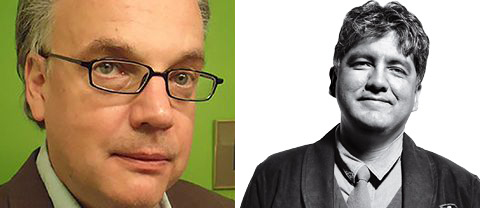
(L) Michael Derrick Hudson AKA Yi-Fen Chou (R) Sherman Alexie
By Jason Cruz
Northwest Asian Weekly
Michael Derrick Hudson is under scrutiny after using the name Yi-Fen Chou when submitting a poem that made it into the annual “Best American Poetry” anthology. The discovery and fallout has the poetry community up in arms and raises the question of race.
Hudson’s poem “The Bees, the Flowers, Jesus, Ancient Tigers, Poseidon, Adam and Eve” was submitted and rejected by journals 40 times under his own name, but only nine times under the Chinese name he adopted. The Chinese name was used as a strategy to get his works published. Hudson states this in his bio for the anthology.
According to the New York Times, the pseudonym used by Hudson came from a person he went to high school with in Fort Wayne, Ind. The family of a woman named Yi-Fen Chou has demanded that Mr. Hudson stop using the name.
The sister of Yi-Fen Chou said that Hudson showed a “lack of honesty” and “careless disregard for Chinese people and for Asians.” Yi-Fen Chou is a nuclear engineer in Chicago that now goes by a married name. However, her sister Ellen Chou, indicated that she did not want to be identified or interviewed about the name controversy. The name was given to Yi-Fen by a paternal grandfather. The Chou family emigrated from Taiwan in 1977 and settled in Fort Wayne.
Prior to this controversy, Hudson’s poem, under the pen name Yi-Fen Chou, was accepted by a literary journal produced by the University of Nebraska-Lincoln. It found its way to the 2015 edition of “Best American Poetry,” which was edited by Washington state native Sherman Alexie. The anthology is a prestigious honor in the literary community. Upon learning the news, Hudson contacted Alexie about his actual identity. Alexie decided to publish Hudson’s poem despite the revelation. In an explanation that exceeded the word count of Hudson’s poem, Alexie gave a thoughtful, perhaps over analytical and detailed explanation on why he chose Hudson’s poem and kept it in the publication. He admitted that the Chinese name persuaded him into giving the poem more consideration than he may have if Yi-Fen Chou did not pen the poem. “I will pay close attention to the poets that have been underrepresented in the past,” Alexie wrote. Although Alexie was angry at the “subterfuge,” he determined that the poem was still compelling and “it didn’t contain any overt or covert Chinese influences or identity.” While some within the poetry community thought Alexie’s comments were honest, it could also be seen as a case of overthinking.
Although using an alias instead of your real name is not unheard of in the writing industry, using a name in order to gain an advantage is the issue which hits home with many individuals. In this case, many Asian American writers took issue with the misrepresentation. “[I]f there is such a thing as employing yellowface in poetry, this has to be it,” stated blogger Phil “Angry Asian Man” Yu. “He (Hudson) sort of implies that minorities are published because we’re minorities, not because of our work,” said Chapman University professor Victoria Chang, “That’s just insulting because it strips everything we’ve worked so hard for.”
The use of a Chinese name by a white person sparked comparisons to ousted Spokane, Wash. NAACP leader Rachel Dolezal. She was the white woman that became president of the Spokane NAACP, although she claimed that she was black. Hudson utilized Yi-Fen Chou to gain a perceived advantage in the literary world. It appears that it has worked in his favor as the poem received the consideration to be one of 75 poems to be deemed the “best of” 2015. (end)



